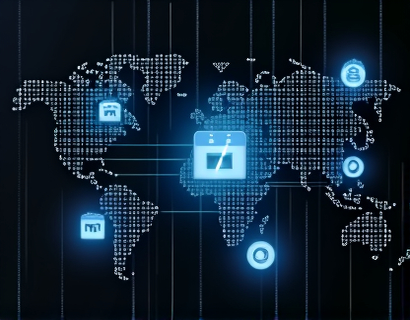Unlocking Digital Transformation: Advanced AI and Crypto Strategies for Enhanced App Promotion in the Ucosystem
The digital landscape is rapidly evolving, driven by the convergence of artificial intelligence and blockchain technology. This transformation presents unprecedented opportunities for app developers and marketers to revolutionize how applications are promoted and engaged with. By leveraging advanced AI and crypto strategies, tech innovators can unlock new dimensions of user engagement, drive blockchain adoption, and redefine digital marketing. This article delves into these advanced strategies, exploring how they can be harnessed to enhance app promotion and foster a more interactive and secure digital ecosystem.
Understanding the Digital Transformation Landscape
Digital transformation is no longer a buzzword but a necessity for businesses and developers aiming to stay relevant. It involves integrating digital technologies into all areas of a business, fundamentally changing how it operates and delivers value to customers. In the context of app promotion, digital transformation means adopting cutting-edge tools and methodologies to create, market, and maintain applications that not only meet but exceed user expectations.
The integration of AI and blockchain into this landscape is transformative. AI brings intelligence and automation to the table, enabling personalized user experiences, predictive analytics, and efficient operational workflows. Blockchain, on the other hand, offers a decentralized, secure, and transparent way to manage transactions and data, fostering trust and innovation. Together, these technologies can significantly enhance app promotion and user engagement.
Leveraging AI for Personalized User Experiences
One of the most impactful ways AI can enhance app promotion is through personalized user experiences. By analyzing vast amounts of user data, AI algorithms can identify patterns and preferences, allowing apps to tailor content, recommendations, and interactions to individual users. This personalization not only improves user satisfaction but also increases engagement and retention rates.
For instance, AI-driven chatbots can provide real-time customer support, answering queries and guiding users through the app's features. These chatbots can learn from interactions, becoming more efficient and effective over time. Additionally, AI can optimize app interfaces based on user behavior, ensuring that the most relevant features are easily accessible.
Predictive analytics is another powerful AI application. By forecasting user behavior and trends, apps can proactively address user needs and preferences. For example, an e-commerce app can use predictive analytics to suggest products based on a user's browsing and purchase history, increasing the likelihood of conversions. This level of personalization not only enhances the user experience but also drives higher conversion rates and revenue.
Enhancing App Security with Blockchain
Security is a critical concern in app promotion, especially as users become more aware of data privacy issues. Blockchain technology offers a robust solution by providing a decentralized and immutable ledger for transactions and data storage. This inherent security makes it an ideal tool for enhancing app security and building user trust.
One key application of blockchain in app promotion is in the area of data privacy. By using blockchain to manage user data, apps can ensure that user information is stored securely and transparently. Users can have control over their data, deciding who can access it and for what purposes. This level of control can significantly boost user confidence and loyalty.
Blockchain can also be used to create secure and transparent reward systems. For example, apps can implement token-based reward mechanisms where users earn tokens for completing specific actions, such as referring friends or engaging with the app's content. These tokens can be stored in a user's digital wallet and exchanged for app-specific benefits or even real-world goods and services. This not only incentivizes user engagement but also creates a community-driven ecosystem.
Driving Blockchain Adoption Through App Promotion
While blockchain offers numerous benefits, its adoption remains limited due to a lack of understanding and trust. App promotion strategies can play a crucial role in driving blockchain adoption by educating users and demonstrating the value of blockchain technology.
One effective approach is to integrate blockchain features seamlessly into the app, making them user-friendly and intuitive. For example, a financial app can use blockchain to facilitate secure and transparent transactions, clearly explaining the benefits to users. By highlighting how blockchain ensures security, reduces fraud, and increases transparency, apps can help users overcome their skepticism and embrace these technologies.
Collaborations and partnerships can also accelerate blockchain adoption. Apps can partner with blockchain startups and organizations to develop innovative features and solutions. These collaborations can lead to the creation of new use cases and applications, further demonstrating the potential of blockchain. By showcasing successful case studies and real-world applications, apps can build credibility and trust among users.
Revolutionizing Digital Marketing with AI and Crypto
The intersection of AI and blockchain opens up new possibilities for digital marketing, enabling more effective and ethical promotional strategies. Traditional marketing methods often rely on invasive data collection and targeted ads, which can be met with resistance from users. AI and blockchain offer a more balanced approach that respects user privacy while delivering targeted and relevant content.
AI can enhance the efficiency of marketing campaigns by automating tasks such as content creation, audience segmentation, and performance analysis. Machine learning algorithms can analyze user data to identify the most effective content types and delivery channels, optimizing campaigns in real-time. This not only improves the return on investment but also reduces the risk of user fatigue and ad fatigue.
Blockchain can further enhance marketing efforts by providing a transparent and tamper-proof way to manage customer data and rewards. Smart contracts can automate the distribution of rewards, ensuring that users receive their tokens or benefits without the need for intermediaries. This transparency builds trust and encourages user participation in marketing initiatives.
Another innovative approach is the use of decentralized advertising platforms. These platforms leverage blockchain to connect advertisers directly with users, eliminating the need for traditional ad exchanges. This not only reduces costs but also ensures that users are compensated for their data and attention. For example, a decentralized platform can allow users to earn tokens by viewing ads, which can then be spent within the ecosystem or exchanged for other digital assets.
Building a Community-Driven Ecosystem
A key advantage of combining AI and blockchain is the ability to build a community-driven ecosystem around an app. This ecosystem fosters collaboration, innovation, and mutual benefit among users, developers, and the app itself.
Tokenization is a powerful tool for creating such ecosystems. By issuing utility tokens, apps can incentivize users to contribute value, whether through content creation, moderation, or other forms of engagement. These tokens can be used to access premium features, participate in governance, or earn rewards, creating a self-sustaining and motivated community.
AI can enhance community management by analyzing user interactions and feedback, identifying trends and areas for improvement. Chatbots and virtual assistants can facilitate communication between users and the app's development team, ensuring that user voices are heard and addressed promptly. This level of engagement not only improves the app but also strengthens the community's bond with the app.
Moreover, blockchain-based governance models can empower users to have a say in the app's development and direction. Through decentralized autonomous organizations (DAOs), users can propose and vote on changes, ensuring that the app evolves in line with user needs and preferences. This democratic approach not only enhances user satisfaction but also fosters a sense of ownership and loyalty.
Case Studies and Real-World Applications
Several apps have successfully implemented AI and blockchain strategies to enhance their promotion and user engagement. One notable example is a decentralized social media platform that uses blockchain to give users control over their data and a token-based economy to reward content creators. By leveraging AI for content curation and recommendation algorithms, the platform has achieved high user engagement and retention rates.
Another example is a gaming app that integrates blockchain for in-game asset ownership and trading. Using AI to personalize game experiences and optimize matchmaking, the app has seen significant growth in user base and active players. The transparency and security provided by blockchain have also attracted a loyal community of gamers who value their digital assets.
These case studies demonstrate the potential of AI and blockchain in transforming app promotion and user engagement. By adopting these technologies, developers can create innovative, secure, and user-centric applications that stand out in a crowded market.
Conclusion
The convergence of AI and blockchain presents a powerful toolkit for app developers and marketers aiming to drive digital transformation. By leveraging these technologies, apps can offer personalized and secure user experiences, drive blockchain adoption, and revolutionize digital marketing. The key to success lies in understanding the unique benefits of each technology and integrating them in a way that enhances the overall user journey.
As the digital landscape continues to evolve, those who embrace AI and blockchain will be well-positioned to lead the charge in app promotion and user engagement. By fostering a community-driven ecosystem and adopting ethical marketing practices, developers can not only enhance their apps but also contribute to a more transparent and inclusive digital world.











































